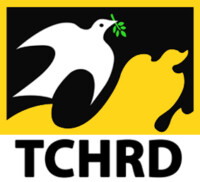
First detained in 1987 for peaceful demonstrations, Ngawang Phulchung has relentlessly championed the education of Tibetan people regarding their human rights and democratic freedoms. The publishing of a complete Tibetan translation of the Universal declaration of Human Rights and the reporting of human rights violations within Tibet resulted in a 19-year sentence which he is presently serving.
Ngawang Phulchung joined Drepung Monastery at an early age and reached an advanced level of study in Buddhist philosophy. By 1989 he was just a short step from attaining the degree of Geshi (Doctor of Philosophy in Buddhism), but at this point felt compelled to concentrate his energies on the Tibetan struggle for political and religious freedom.
On 27 September 1987, Ngawang Phulchung and 20 other monks of Drepung Monastery staged a peaceful demonstration in central Lhasa demanding human rights including religious freedom and the right to self-determination for Tibetans.
This was a turning point in the Tibetans’ struggle to be heard and sparked off a series of public freedom marches. Prior to this day few had dared express concerns for fear of ruthless Chinese reprisals.
The Chinese authorities dealt violently with the demonstrators. They were beaten and dragged to prison and Ngawang was held without charge for four months. Finally he was released in January 1988 following intense international media attention and pressure and the personal intervention of the late Panchen Lama.
Soon after his release Ngawang gave his reasons for participating in the march as support for His Holiness the Dalai Lama and a protest against the Chinese condemnation of His Holiness’ Five Point Peace Plan as an attempt to split the motherland. Asked whether he and the others were afraid to demonstrate, the reply was “No, we were not frightened … we were already prepared to give up our lives for the six million Tibetans. Anyway, sacrificing your life is not against Buddhism”.
In April 1989 Ngawang Phulchung and three other monks were arrested for forming a “counter-revolutionary group” which had clandestinely produced political leaflets from their monastery.
Amongst the “reactionary literature” published by the group was a complete Tibetan translation of the Universal Declaration of Human Rights. They also reported on political unrest in Tibet, criticised human rights violations by the Chinese and listed names of persons arrested or killed by the Chinese police and military, and alerted Tibetans to the international support for their cause.
Another document entitled “The Meaning of the Precious Democratic Constitution of Tibet” described a parliamentary system for an independent Tibet relying on the traditional principles of Buddhist dialectics to analyse the concept of democracy and calling on the Tibetans to fight “with inner strength”. The group was branded as “the scum of religious circles” and, in order to make an example of them, the Chinese authorities staged a public show of their trial. Sentenced before a forced public gathering of 1500 Tibetans on 30 November 1989, the crowd was told that the monks had “venomously slandered our socialist system characterised by the people’s democratic dictatorship”.
Ngawang was denounced as the leader of the group and sentenced to nineteen years in prison followed by deprivation of political rights for five years.
At the sentencing rally the Lhasa Intermediate People’s Court charged him with “organising and joining a counter-revolutionary clique and spreading counter-revolutionary propaganda and inflammatory disinformation”, “seriously undermining national security” and “collecting intelligence and passing it on to the enemy”.
On the day of the sentencing, the Chinese government broadcast the following warning: “The crimes committed by Ngawang Phulchung and other criminals demonstrate that the so-called human rights, freedoms and democracy played up by separatists both at home and abroad are nothing but a pack of deceitful lies … Let the sentence of Ngawang Phulchung serve as a stern warning for separatists both at home and abroad that those who split the motherland will come to no good end”.
On 30 March 1991 an American delegation visited Drapchi prison and a group of prisoners handed the diplomats a petition allegedly protesting detention conditions. The petition was confiscated and after the visit the prisoners, including Ngawang, were reportedly severely beaten and placed in solitary confinement.
Undeterred, Ngawang and other prisoners have continued to protest against the ill-treatment of prisoners, with the inevitable result that they have been beaten or placed in dark isolation cells. Ngawang Phulchung is now 36 or 37 years old and is in Drapchi prison.
